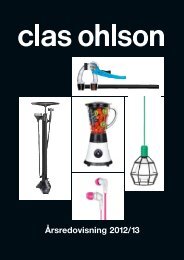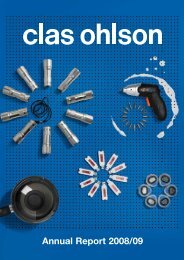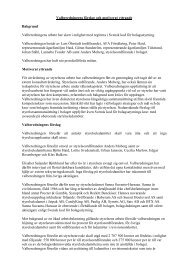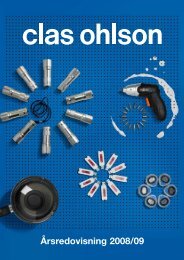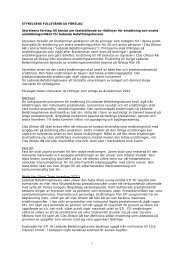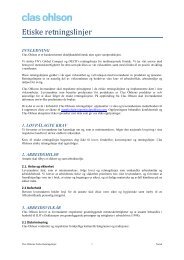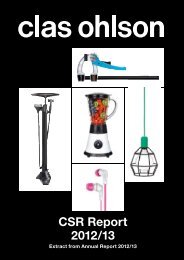Annual Report 2012/13 - Clas Ohlson
Annual Report 2012/13 - Clas Ohlson
Annual Report 2012/13 - Clas Ohlson
Create successful ePaper yourself
Turn your PDF publications into a flip-book with our unique Google optimized e-Paper software.
nance of subsidiaries, as well as the election of Board<br />
members and the CEO. The Board is also responsible for<br />
the quality of the financial reporting. The CEO in turn is<br />
responsible for ensuring that the company is managed in<br />
accordance with Board’s guidelines and instructions. In<br />
addition, the CEO is responsible for budgeting and planning<br />
the company’s operations so that specified goals are<br />
attained. The CEO ensures that the control environment<br />
is favourable and that the Group’s risk-taking at any time<br />
is compatible with the Board’s guidelines. Any deviations<br />
have to be reported to the Board. The Board also receives<br />
regular information from the CEO through a monthly<br />
report.<br />
CEO and Group Management<br />
<strong>Clas</strong> <strong>Ohlson</strong>’s CEO leads the Group Management’s work<br />
and makes decisions pertaining to the operations in consultation<br />
with others in the management team. At the end<br />
of the financial year, Group Management comprised ten<br />
individuals and meetings were held monthly and as otherwise<br />
necessary. The meetings focus primarily on strategic<br />
and operative monitoring and development, as well as<br />
budget follow-up. In addition to these meetings, there is<br />
close daily cooperation within management.<br />
Governance of subsidiaries<br />
The four wholly owned subsidiaries <strong>Clas</strong> <strong>Ohlson</strong> AS in Norway,<br />
<strong>Clas</strong> <strong>Ohlson</strong> OY in Finland, <strong>Clas</strong> <strong>Ohlson</strong> Ltd in the UK<br />
and <strong>Clas</strong> <strong>Ohlson</strong> Ltd (Shanghai) in China are governed<br />
by their own boards in the country concerned, principally<br />
consisting of representatives of <strong>Clas</strong> <strong>Ohlson</strong> AB in Sweden.<br />
The Board in Sweden receives continuous information<br />
about the subsidiaries through the President’s monthly<br />
reports on the subsidiaries. These reports also include the<br />
results of operations and financial position of the company<br />
concerned.<br />
External and internal control instruments<br />
<strong>Clas</strong> <strong>Ohlson</strong>’s governance occurs within the framework for<br />
external control instruments. For example, NASDAQ OMX<br />
Stockholm’s rules and regulations, the Swedish Companies<br />
Act and the Swedish <strong>Annual</strong> Accounts Act, to mention<br />
a few.<br />
Furthermore, there are internal control instruments consisting<br />
of the articles of association, the Board’s work procedures,<br />
instructions for the CEO, policies, guidelines, as<br />
well as <strong>Clas</strong> <strong>Ohlson</strong>’s values/corporate culture.<br />
<strong>Clas</strong> <strong>Ohlson</strong>’s corporate culture<br />
The core of <strong>Clas</strong> <strong>Ohlson</strong>’s corporate culture is salesmanship<br />
– “we focus on the customer and seek to pursue<br />
good business.” Our corporate culture is based on<br />
warmth, commitment, drive and innovation. These common<br />
values permeate the daily work. One example of this<br />
is that all new employees in all the Group’s stores undergo<br />
their basic training at Insjön.<br />
Remuneration<br />
Fees paid to the Board during the financial year totalled<br />
SEK 3.0 M, in accordance with the resolution by the AGM.<br />
Of the fees paid, SEK 0.6 M pertained to remuneration for<br />
work on the Board’s Remuneration and Audit Committees.<br />
Of the Board’s total fee, SEK 0.7 M was paid to the<br />
Chairman of the Board. No fee is paid to Board members<br />
who are employees of the company.<br />
No remuneration is paid to members of the Nomination<br />
Committee. The company’s CEO received pay totalling<br />
SEK 5.7 M during the equivalent period, of which SEK<br />
1.1 M was in the form of variable remuneration (STI refer<br />
to Note 6). Variable remuneration of SEK 0.0 M pertaining<br />
to an expensed but not definitive portion of long-term<br />
incentive programmes (LTI 2010, LTI 2011 and LTI <strong>2012</strong>)<br />
was calculated for the CEO. The amount includes recovery<br />
pertaining to LTI 2010 since no options were distributed.<br />
Remuneration to the other nine senior management totalled<br />
SEK 16.4 M, of which SEK 2.3 M was in the form of<br />
variable remuneration. Variable remuneration pertaining<br />
to the expensed but not definite portion of the long-term<br />
incentive programmes was calculated to SEK 0.2 M. All<br />
ten senior executives receive the additional benefit of a<br />
company car. The <strong>2012</strong> <strong>Annual</strong> General Meeting decided<br />
on guidelines for remuneration to senior management pertaining<br />
to the <strong>2012</strong>/<strong>13</strong> financial year.<br />
Severance pay<br />
Under the contract of employment with the CEO, the<br />
mutual period of notice is six months. Twelve months’<br />
salary is payable in the event of termination by the company.<br />
Applicable basic salary, variable remuneration and<br />
benefits are payable during the period of notice.<br />
Composition of the Board and attendance during the financial year 6<br />
Remuneration<br />
7, 8<br />
1<br />
Member Elected Independent<br />
2<br />
Independent Board meetings Audit Committe Committe<br />
Anders Moberg 2003 Yes Yes 8/8 4/4<br />
3<br />
Klas Balkow 2007 No Yes 8/8<br />
Björn Haid 1990 Yes No 8/8 4/4<br />
Cecilia Marlow 2007 Yes Yes 8/8 7/7<br />
Lottie Svedenstedt 2004 Yes Yes 8/8 7/7<br />
Sanna Suvanto-Harsaae 2010 Yes Yes 8/8 4/4<br />
Urban Jansson 2005 Yes Yes 8/8 7/7<br />
Edgar Rosenberger 2009 Yes Yes 8/8 3/4<br />
1<br />
Independent in relation to the company and company management according to the Swedish Corporate Governance Code.<br />
2<br />
Independent in relation to major shareholders of the company according to the Swedish Corporate Governance Code.<br />
3<br />
President and CEO.<br />
4<br />
Major shareholder, see page 47.<br />
5<br />
Chairman.<br />
6<br />
The trade-union organisations have had two representatives on the Board.<br />
For further information on Board members, see pages 78–81. The work of the Board and its committees is described on pages 50–55.<br />
7<br />
For information on date of birth, work experience, assignments and shareholdings, see pages 78–81.<br />
8<br />
Remuneration of Board members is stated in Note 6, see page 68.<br />
4<br />
5<br />
5<br />
5<br />
Corporate governance 53




